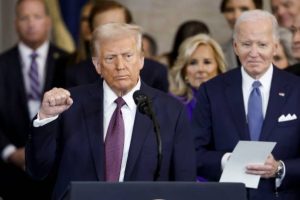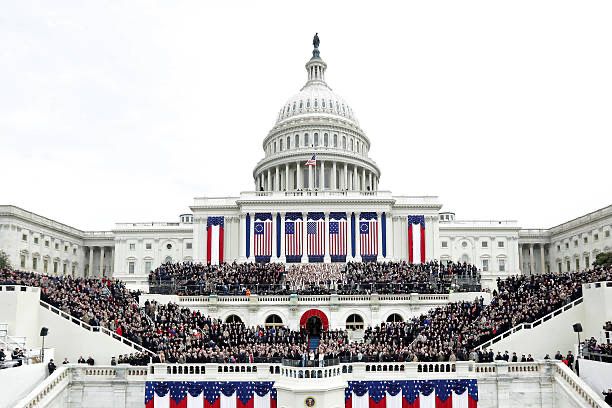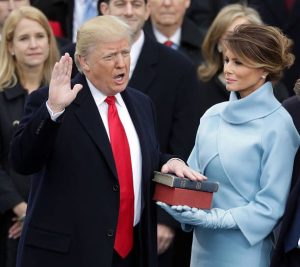Donald Trump has been in office for only ten days, and yet it seems like his second term is breaking the abysmal trajectory set down in the first term. In the capitalist industrial complex of the world we live in today, where genocides serve as collateral damage for power politics and racial justice is considered a bigger sin than the fact that the president of the largest colonial nation in the world is a convicted felon himself, it is not farfetched to recognise the patterns from last year’s terms and also brace ourselves for the months to come.
While Trump’s return to the White House has sent ripples through geopolitical masses, likewise, for Pakistan, the faithful third-world lapdog (both in policy and spirit), whose relationship with the US has oscillated between strategic partnership (only when communist forces threaten to dismantle world order through Afghanistan) and wary distrust (when our people get outright murdered, persecuted, and racially profiled), this Republican resurgence raises critical questions. What does the new administration mean for Pakistan’s economy, security considerations, and third world rankings? More importantly, what do Pakistanis think of the renewed political dynamic?
To answer these questions, we conducted a survey to analyse Pakistani perceptions of the new US regime and explored insights into both the level of scepticism harboured towards American leadership and the comparison between the current and the former Biden administration. The results, while interesting in their variety, reveal a compelling picture of public sentiment and offer nuanced outlooks on Pakistan’s changing geopolitical interests.
How do you currently perceive Pakistan-US relations?
Interestingly, while one third of the respondents agreed that the current relationship dynamic was ‘very positive,’ a majority leaned towards the negative side, ranging from ‘very negative’ to ‘somewhat negative’ on the scale.
It is important to remember that while many DEI executive decisions have been made by the Trump administration in the past few days, none have specifically targeted Pakistanis, a feat that might be an early celebration for most, since it is superfluous to assume optimistic reckonings from a regime building itself on the caricature of equity and inclusion that is at the heart of the Pakistani dream in the bigger American dream.

How do you think Trump’s presidency will impact Pakistan?
In this case, an overwhelming seventy percent agreed that it will have little to no impact on Pakistan, especially because US policy on Pakistan was consistent regardless of the leadership at hand. However, a certain fragment of the respondents were confident that the presidency will definitely add more pressure on Pakistan’s foreign policy and regional security alliances.
For those thinking that the US policy on Pakistan does not change with leadership, I simultaneously agree and digress. Yes, there is hardly a change recorded when the motive is the same: economic hyperdependency and strategic destabilisation against regional hegemonies, particularly India and Afghanistan. And yet, there has been a legacy of gross violations that have only spiralled over the past few decades, from Obama’s “low casualty” drone strikes to Biden’s “do more” NATO reprimands and the frankly disturbing Trump era; Pakistan does not have much to look forward to. It is also essential to add, retrospectively, that the leadership in Pakistan certainly has a huge impact on the kind of treatment the US administration extends. And that does not include retired generals.
Which of the following global issues do you think will be most affected by Trump’s policies?
The most common themes among the responses included US-China relations, Pakistan’s regional stability, climate change, the global economy, immigration, and the Palestine conflict. A majority agreed for the latter to be the most relevant, and proof of that has been surfacing in the past few days, with unconstitutional executive orders on disbarring F1 visas for “pro-Hamas” foreign nationals, increasing military aid to Israel, and the change in the definition of antisemitism adopted by many college campuses in the last week.

How much do you trust the U.S. administration (whether Biden or Trump) to act in Pakistan’s best interests?
All who responded agreed that they ‘completely distrust’ the US administration, regardless of who is running it, which makes for an interesting hindsight. Additionally, a hundred percent of respondents agreed that Pakistan was in dire need of strengthening alliances beyond the United States. This observation leads to a great opportunity for Pakistan’s foreign policy reform, especially in the Global South and with the Balkan states.
What approach should Pakistan take in its foreign policy moving forward?
This question resulted in conflicted opinion, with an equal percentage agreeing that there needed to be a diplomatic balance between relationships with the US and China, reducing reliance on the aforementioned countries, and finally, adopting an independent policy built on national interests rather than global power alignments.
The survey results, coupled with a broader political analysis, reveal an underlying distrust of the US, regardless of the administration.Trump’s return has reignited concerns of a more aggressive and unpredictable stance, urging Pakistan to adopt an equally strong foreign policy to secure its interests. The evolving Pak-US relations are a testament to the fact that diplomacy is not just about engaging with global powers but ensuring that national interests are not compromised. Pakistan has the potential to reimagine its foreign policy stance, an action that will be both welcomed and celebrated by its population.














